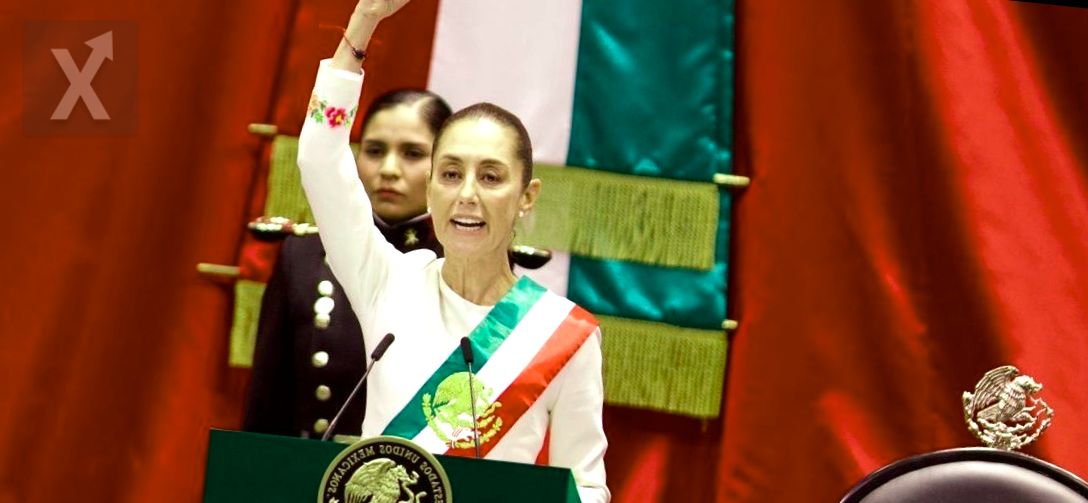Sheinbaum Faces the Challenge of Gaining Investors' Trust

The primary challenge that President Claudia Sheinbaum will face is reassuring investors, who have become concerned about the recent approval of a judicial reform pushed by AMLO, which analysts see as a threat to democracy and the business environment. "The most important challenge for President Claudia Sheinbaum will be to strengthen market confidence and establish a regulatory framework and policies that are predictable and favorable for investment," said Alberto Ramos, head of the Latin America Economic Research team at Goldman Sachs.
Sheinbaum is trying to calm the markets with a commitment to fiscal responsibility. In light of the judicial reform, she attempted to send reassuring signals to investors: "We will promote both public and private investment. Let me be clear: you can be certain that the investments of both domestic and foreign shareholders will be secure here," she stated. The first president in 200 years of Mexico's history takes charge of an economy that has barely grown, amid a wave of violence related to organized crime and the highest fiscal deficit since the 1980s. The first months of her administration could be volatile for local financial markets due to the U.S. presidential elections scheduled for November, especially if former President Donald Trump returns to power. Additionally, the market will be closely watching the introduction of the new government's first national budget before November 15 to assess whether it will manage to reduce the fiscal deficit to 3.5% of GDP, down from the 5.9% projected for the end of this year. During her inaugural speech, Claudia Sheinbaum committed to maintaining fiscal discipline, the independence of the central bank, and promoting the relocation of companies during her term. She also assured that both domestic and foreign investments were secure in the second-largest economy in Latin America. She prompted reflection: "Let’s analyze the hard data: how did 9.5 million Mexicans rise out of poverty? What was the result of not raising taxes and yet reducing inequalities? Why are we less in debt and have a strong currency?"
Furthermore, she emphasized the transformation the country is undergoing, which she called "Mexican humanism." Sending messages to business leaders and members of the judiciary, she assured them that investments would be protected and reminded judges that their rights would be upheld under the reform: "Corruption in the judiciary will end. The people will decide. Is it authoritarian to let the people choose? In a few years, we will all be convinced it was a good reform," Sheinbaum argued. During his term, which began in December 2018, López Obrador raised the minimum wage, reduced poverty and unemployment, expanded social programs, and oversaw the strengthening of the peso—achievements that boosted his popularity and helped Sheinbaum win by a large margin in the June elections. However, while promising "continuity with change," Sheinbaum inherits a significant budget deficit and an economy that, in real terms, grew by only 0.9% during López Obrador's administration. Experts suggest that the second-largest economy in Latin America will need to implement some type of fiscal reform to increase revenues; however, Sheinbaum has indicated that she does not plan a "deep fiscal reform" and will instead focus on reducing bureaucracy and optimizing tax collection at customs and elsewhere. "She will have to undertake a strong fiscal consolidation if she wants to maintain the good impression that the markets have of her," commented Bernardo Keiserman, economist at the investment bank Bradesco BBI. "We believe the government is determined to implement cuts, but achieving one that is significant enough will not be easy. The economy is weak and is likely to weaken further," he added. Recently, the central bank cut its GDP growth forecasts for this year to 1.5% from the previous 2.4%, and lowered its estimate for 2025 to 1.2%. Additionally, the new government inherits a heavy burden from the highly indebted state oil company Pemex.
After the pandemic, nearshoring—relocating production processes to nearby countries to cut costs—has placed Mexico at the center of investment. One of Sheinbaum's challenges will be to increase Foreign Direct Investment while implementing the controversial constitutional reforms inherited from AMLO, such as the popular election of judges and the elimination of autonomous agencies, changes that have caused friction with the U.S. and Canada, her partners in the North American trade agreement. Both countries have expressed their disagreement, as they believe these reforms create uncertainty regarding the rule of law. Furthermore, credit rating agency Moody's has warned that the judicial reform could significantly impact the country's sovereign credit rating. The new leader will have to navigate a tragic context, as, according to UN data, an average of 10 women are murdered every day in Mexico, while facing a surge in violence during the final stretch of AMLO's presidency, which has seen almost 200,000 violent homicides during his term, making it the most violent period in the country's recent history. With information from Reuters, Yared de la Rosa, and Carina García.
In the current context, Sheinbaum's ability to restore investor confidence is essential. The decisions she makes regarding economic policy and public debt management will impact not only her administration's reputation but also the country's financial stability in both the short and long term. Attention to issues like corruption and the rule of law will be crucial for maintaining investment flows and ensuring sustainable growth in Mexico.






